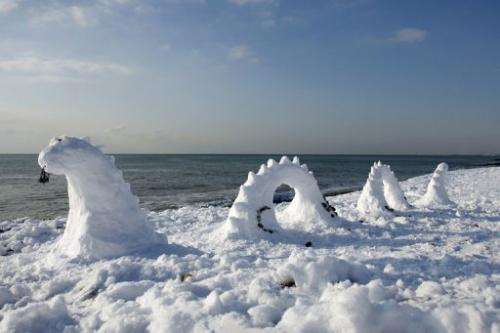A snow sculpture of the Loch Ness monster on Brighton beach in England. Russian explorers claimed a record Wednesday in diving to the bottom of a remote lake at the coldest time of the year but said they could not find its most famed inhabitant, a mythical Loch Ness-style monster.
Russian explorers claimed a record Wednesday in diving to the bottom of a remote lake at the coldest time of the year but said they could not find its most famed inhabitant, a mythical Loch Ness-style monster.
The team dived to the bottom of the remote Labynkyr lake in the Yakutia region of Siberia in the middle of winter, with the outside temperature minus 45 degrees Celsius (minus 49 Fahrenheit), local authorities said in a statement.
The lake is in the region of the Oimyakon village in Yakutia, which is the coldest inhabited place on earth and where temperatures have been known to exceed minus 70 C.
"A world record has been established. For the first time in history, a human being has carried out a dive in the toughest place on earth at the coldest time of the year," the local Yakutia authorities said in a statement.
They said that the team had gathered unique material about climactic systems in the permafrost region.
The remote lake is shrouded in mystery largely because of reports from a Soviet-era expedition which claimed to have seen a mysterious animal that some believed to be a relic of the dinosaur era.
The episode gave rise to the lake's nickname as the "Russian Loch Ness" after the Scottish loch which is also home to a mythical and so far unconfirmed beast.
The team "did not meet a monster at the bottom of the lake," the Russian Geographical Society said, adding that it was trying to register the achievement in the Guinness Book of Records.
(c) 2013 AFP




















